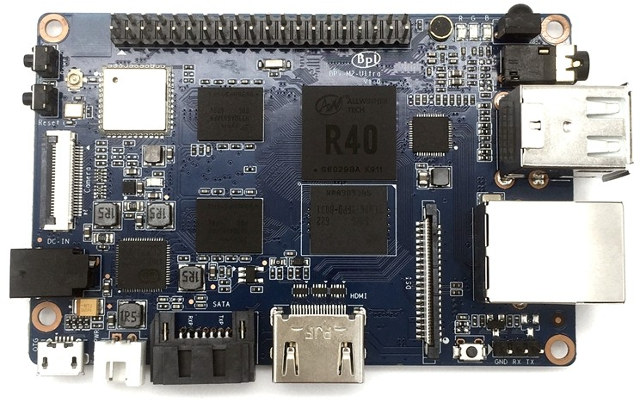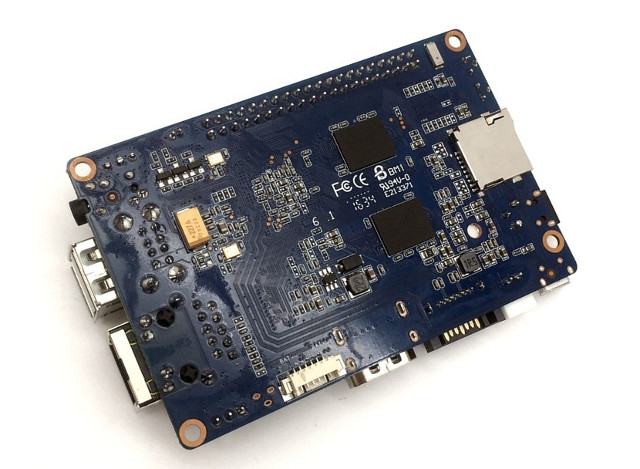Allwinner A10 and A20 processors have been quite popular in the past since they could handle Fast or Gigabit Ethernet and SATA natively, included decent multimedia capabilities, and were found in low-cost hardware such as Cubieboard 2 or MeLE A1000. Since then we’ve had a few boards with SATA using newer and faster processors without SATA IP, meaning it was usually implemented using a USB 2.0 to SATA bridge leading to mediocre to average performance depending on the implementation and selected bridge.
Allwinner R40 is the successor of Allwinner R20 with a faster quad-core Cortex A7 processor, but keeping Gigabit Ethernet, SATA, and most features of its predecessor. The good news is that Banana Pi has now launched the promised M2 Ultra development board based on the new processor for $45.80 + shipping on Aliexpress (Total for me: $48.35).
 Banana Pi M2 Ultra specifications:
Banana Pi M2 Ultra specifications:
- SoC – Allwinner R40 quad-core ARM Cortex A7 processor with ARM Mali-400MP2 GPU
- System Memory – 2GB DDR3 SDRAM
- Storage – 8GB eMMC flash (16, 32 or 64GB as options), SATA interface, micro SD slot up to 256 GB
- Connectivity – 1x Gigabit Ethernet port, 802.11 b/g/n WiFi and Bluetooth 4.0 (AP6212 module)
- Video Output – HDMI 1.4 port up to 1080p60, 4-lane MIPI DSI display connector
- Audio I/O – HDMI, 3.5mm headphone jack, built-in microphone
- USB – 2x USB 2.0 host ports, 1x micro USB OTG port
- Camera – CSI camera connector
- Expansion – 40-pin Raspberry Pi compatible header with GPIOs, I2C, SPI, UART, ID EEPROM, 5V, 3.3V, GND signals.
- Debugging – 3-pin UART for serial console
- Misc – Reset, power, and u-boot buttons; IR receiver
- Power Supply – 5V via barrel connector, or 3.7V Lithium battery via battery connector on the back of the board. AXP221s PMIC
- Dimensions – 92 x 60 mm
Banana Pi claims BPI-M2 Ultra board run Android, Debian, Ubuntu, Raspbian, and other operating systems. You’ll find some images on the Wiki, and while the Android section link does not work, you can download a Linux 3.10 + busybox image, Ubuntu 16.04 Xenial minimal, Debian 8 Jessie Mate, Debian 8 Jessie Lite, and Ubuntu MATE 16.04 from either Baidu or Google drive links. There’s also a Tina-IOT os section that’s empty right now, as is the “source code on GitHub” section, and a few others. So documentation is a work in progress.
 I’m expecting Allwinner R40 boards to become popular at least for some communities such as Armbian, where some members require fast storage and networking performance for their project(s). We’ll have to hope Allwinner has improved SATA write performance compared to Allwinner A20, as in my review of Cubietruck (Metal Case), I found that while read speed was very good at up to 180 MB/s, write speed was limited to around 36 MB/s using a SATA SSD.
I’m expecting Allwinner R40 boards to become popular at least for some communities such as Armbian, where some members require fast storage and networking performance for their project(s). We’ll have to hope Allwinner has improved SATA write performance compared to Allwinner A20, as in my review of Cubietruck (Metal Case), I found that while read speed was very good at up to 180 MB/s, write speed was limited to around 36 MB/s using a SATA SSD.
You may also find some more details on Banana Pi BPI-M2 Ultra product page.

Jean-Luc started CNX Software in 2010 as a part-time endeavor, before quitting his job as a software engineering manager, and starting to write daily news, and reviews full time later in 2011.
Support CNX Software! Donate via cryptocurrencies, become a Patron on Patreon, or purchase goods on Amazon or Aliexpress




